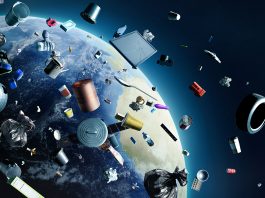Ray Fielding, the Head of Space Sustainability at the UK Space Agency, spoke with The Innovation Platform’s Maddie Hall to discuss the issue of debris in space and what can be done to combat it.
Space debris can cause many issues, from collisions to explosions of residual fuel. In recent years, legislation has been put in place to try to minimise the amount of debris put into the space surrounding Earth and remove some.
More needs to be done, however. The space around Earth is important not just for space exploration, but for satellites and expanding our capabilities and understanding of the world and the Universe. Yet the amount of debris in our immediate space threatens the future of continued operations.
The UK Space Agency is an organisation with over a decade of experience working towards a sustainable space ecosystem. The Innovation Platform’s Editor, Maddie Hall, sat down with the UK Space Agency’s Head of Space Sustainability, Ray Fielding, to talk about this issue and what will be done in the future.
Can you discuss the Agency’s sustainability strategy?
The National Space Strategy, published in September 2021, outlines our commitment to sustainability and safety in space. Seeking to deliver the strategy, the UK launched its first Plan for Space Sustainability in 2022, which focuses on three main areas: Prevent, protect, and promote. While the most simple solution may be to ban future launches altogether, this is impractical and prevents the ability to realise the societal and economic benefits of space. There is a balance to be struck in attaining these benefits in a responsible way:
Prevent
By implementing and encouraging responsible behaviours nationally and internationally, we can prevent the issue of debris. The Agency recently led a large consultation across the entire space community that considered regulations and areas of improvement for space sustainability. For example, one of the questions raised was the 25-year rule for deorbiting spacecraft and whether this was still applicable, as this rule was established when there were hundreds, not thousands, of objects in orbit – now 36,000 debris objects over ten centimetres and counting.
Protect
To protect the orbital environment, the UK Space Agency is creating the National Space Operations Centre (NSPOC), which provides orbital tracking data to UK-registered satellite operators. The objective is to reduce debris created from space collisions by informing operators of conjunctions (when two satellites are approaching one another) with sufficient time to act and avoid potential collision courses. This is not limited to British satellites approaching other British satellites but also British satellites approaching anything that could create further debris.
To help protect the orbital environment, the UK Space Agency with our partners in the Ministry of Defence, are planning to create a UK National Space Operations Centre (NSpOC), which will develop and operate new and existing space surveillance and protection capabilities. The industry facing part of the NSpOC is our collision alert service for industry: ‘Monitor Your Satellites’ which provides collision alerts and manoeuvre support information to UK-registered satellite operators. The objective is to protect UK satellites and prevent collisions that would create additional debris/hazards.
The UK Space Agency has also initiated the National Active Debris Removal mission, which will capture two defunct British satellites from orbit that now pose a space hazard. This is unique in a number of ways. Currently, most, if not all, satellites cannot be refuelled, meaning their lives are dictated by the amount of fuel they can carry – this is like purchasing a car with only one tank of fuel and dumping it. In this pioneering mission, the removal satellite will not be single-use. After capturing both satellites, it will return to a safe orbit to be refuelled, creating the potential for a third mission. The mission is also ambitious in the satellites it aims to capture as they pose very unco-operative targets, spinning and moving at 17,500 mph. Precision is required for it to succeed, and the innovative, cutting-edge technology in development in the UK will be integral in achieving this.
Promote
It is easy to forget the sheer quantity of space debris flying over our heads daily. The sky is a collage of debris, and if not controlled, there is a very real danger that the orbital region will be degraded or even denied to us completely. Though space is vast, the usable area in which we can operate satellites is relatively small and contained. Collisions result in further collisions, scattering debris across the space environment until it is wholly inaccessible – Kessler syndrome.
As space debris increases, so too does the risk it may pose. More and more debris is falling back to Earth. While most fall in the ocean, some do not, and the threat of human casualties is only growing. In 2022, Spanish airspace was shut for days while a rocket body fell, for fear it could impact aircraft, a decision that cost millions of euros.
Consider the seamless integration of space services into everyday life. From smartphones to navigation, financial transactions to weather forecasting, the loss of our space capabilities would be felt universally. Promotion and raising awareness around this subject is, therefore, vital. The growing danger of space debris is not limited to the space community, and we must do what we can to protect that environment before it is lost to us.
With its National Space Strategy, the UK Space Agency aspires to be amongst world leaders in advocating for responsible space. Recently, the whole Agency has been restructured to include space sustainability as one of its eight key priorities. As a result, an increased budget and dedicated resources have been directed to the new Space Sustainability department, aimed at tackling and raising awareness of the growing issues of sustainability in the space environment.
How is the UK working to regulate the space industry?
As part of the ‘prevent’ branch of the space sustainability strategy, the Agency is dedicated to sustainable regulation, ensuring all UK-registered entities intending to launch or operate a spacecraft have the appropriate plans and policies in place to align with sustainability goals.
Part of this effort is the development of space sustainability standards. The UK Government is not an anchor customer for space operations – it does not have its own fleet of satellites. Instead, the commercial sector takes the lead in building and operating satellites that the UK Civil Aviation Authority regulates, with the Agency working to embed sustainability into business practices.
By supporting the Earth and Sustainability Initiative, the Agency hopes to establish a set of British standards for sustainability in space operations that can hopefully extend to international standards, aiming to address questions relating to rendezvous and proximity operations, launch, and deorbit, among others. This is currently underway, with funding provided to research and catalyse the implementation of nine or ten standards for the industry. Work developing guidance around the first two standards is nearly complete and will be followed by the others in the coming months and years. Increased regulation will not only progress space sustainability but will also benefit the industry as independent certification of sustainable co-operation could lead to cheaper insurance or easier licensing.
The Astra Carta, an initiative launched in 2023 and and led by the Sustainable Markets Initiative as a result of His Majesty the King’s vision for space sustainability, looks to ensure that all of humanity’s endeavours off-planet – whether that be low Earth orbit, lunar, or deep space exploration – are sustainable. This is primarily targeted at industry to ensure sustainable business models are carefully planned and avoid polluting other planets with waste like we have in our oceans. Signing up for the initiative grants a business the Astra Carta seal of approval, indicating that an organisation is a trusted sustainable operator that considers space sustainability at the heart of its business practices.
How is the UK Space Agency addressing the issue of energy? What role could renewable energy play in future space missions?
There is a range of activity in this sector, but it is still in the early stages of development. The UK Space Agency does not focus on terrestrial energy consumption, with our work directed at the energy consumption of a launch supply chain and alternative energy sources such as space-based solar power. We are collaborating with the European Space Agency (ESA) to realise space-based solar power, considering the feasibility of necessary factors like square kilometre footage, costs for construction and operation, the technologies required, and the environmental consequences of such an endeavour.
The Space Sustainability team is exploring the potential of in-orbit servicing and manufacturing. This aims to operate satellites autonomously and use them as robotic assembly vehicles for manufacturing components and refuelling and repairing satellites in space. Remote technology such as this is essential for constructing a space-based solar power station, but the technology is still in development.

The debris removal mission will be an important step in the journey towards space-based solar power. If successful, the remote technologies and refuelling concept can be de-risked and employed for other space-based assemblies.
How are you collaborating with international space agencies on sustainability issues?
Space does not respect national boundaries, so collaboration is key to ensuring sustainable space operations. Despite our national initiatives and intentions to operate responsibly, the international community must work together to tackle the growing problem of space debris. Working closely with the ESA and UN is vital in the UK Space Agency’s prevention efforts. Recently, the ESA has launched its Zero Debris Charter, with which all ESA missions must comply going forward.
The UN Committee on the Peaceful Uses of Outer Space (COPUOS) and the Inter-Agency Space Debris Coordination Committee (IADC) – of which the UK Space Agency is a member – are collaborating to establish and promote global space sustainability guidelines. Through this, the UK Space Agency has been consulting with numerous agencies worldwide closely and often on potential long-term goals and regulations to embed the outputs into national regulation, licensing practices, and mission operations.
Additionally, the Agency conducts a number of bilateral initiatives and is currently looking to work with overseas partners on atmospheric ablation. Satellites are currently disposed of by deorbiting them into the upper atmosphere, where they burn up to atoms. However, it is not known whether this process has a negative effect on the upper atmosphere. While any harmful effects may currently be negligible with only 8,000 satellites in orbit, it is essential to be prepared for the 50,000 expected by 2030.
It is vital that we take action early to avoid a repeat of past mistakes. Globally, we are now dealing with the consequences of delayed actions and reactions to emissions and climate change challenges. By collaborating with the ESA and the US, the UK Space Agency seeks to be more proactive, enhancing research into this area and working with academics globally to provide a more definitive answer to this potential problem and its consequences before becoming a larger issue.
Following COP28 and the announcement of the UK-led climate satellite contracts, can you expand on the TRUTHs mission, your involvement, and its significance?
The TRUTHs mission hopes to improve the accuracy of climate measurements tenfold. It is an ESA mission, largely led by the UK and with the Agency as the largest sponsor. TRUTHs will increase fidelity and accuracy in calibrating measurements, enabling faster and more informed decisions to improve climate models and policy. The dangers posed by climate change are recognised globally, and quick decision-making ratified with accurate and timely data is going to be crucial for tackling these issues.
Space sustainability is vital for the future of space exploration
The UK Space Agency space debris removal mission is an incredible achievement for the organisation, marking its first NASA equivalent mission. Previously, the missions have been delivered by others while the Agency contributed the science or instruments. This mission, led by two UK consortia, Astroscale and Clearspace, and backed by an enormous range of UK subcontractors, will be the first entirely led by the UK Space Agency. We are now finishing the preliminary design spacecraft phase, with hopes to take that into a finalised design and build phase for launch in 2026 or early 2027.
There is a reason the Agency has spent £5m purely on the design studies for the national active debris removal mission. Space sustainability is worthy of significant time and resources. It is vital for the future of space exploration and to support the growing in-orbit infrastructure. Globally, we must be proactive to assess and avoid problems before they grow. With several projects and collaborations underway, the Agency is dedicated to shaping a regulated and sustainable space ecosystem that unlocks the benefits that space offers, and minimises damage – watch this space for more.
Please note, this article will also appear in the seventeenth edition of our quarterly publication.









